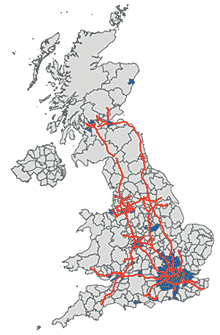
Hydrogen car proponents in the United Kingdom have been making plans to put 1.5 million H2 drivers on the British roads by 2030. According to the H2UKMobility plan, hydrogen fuel cell cars will start hitting the streets of Great Britain in 2015 and will see slow sales to early adopters up until 2020.
At this point the plan states that fuel cell cars and infrastructure will become more mainstreamed with high public interesting in driving H2 vehicles from 2020 and beyond.
According to the UK publication, The Register, “A timeline drawn up by UKH2Mobility – a consortium of 11 car-makers, fuel cell specialists and hydrogen producers, three government departments and one fuel retailer, Morrisons – assumes there will be little demand for hydrogen fuel cell (HFC) powered vehicles between the five years from the initial availability of such cars and 2020, but demand will dramatically increase in the following 10 years.
“The boom is predicated on the 10 per cent of motorists who will become HFC early adopters creating a sufficient market for the fuel to drive the roll-out of a nationwide hydrogen infrastructure. UKH2Mobility came up with its ten per cent figure after talking to 2000-odd consumers.”
One has to wonder what figure they would have come up with by talking with 2,000 not so odd consumers? 🙂
The Register goes onto say, “If all goes according to plan, the number of fuelling sites could ramp up to around 330 in 2025 – enough for half the population, though with an inevitable focus on London and the South East – reaching 1150 by 2030, at which point all Britons are within reasonable driving range of a hydrogen fuel source.”
According to the H2UKMobility Roadmap by 2030 most of the hydrogen created for vehicles will be by the use of electrolysis. Steam reforming of methane, which is now the most popular method for creating hydrogen, will by 2030, fall into second place and decline over the following years.
Great Britain is the 9th largest island in the world and the 3rd most populous. The UK has a grand amount of renewable energy potential with regard to onshore and offshore wind, marine energy and biomass.
It makes great sense for Britain to use their renewable resources, create hydrogen, refuel fuel cell cars, reduce pollution and stimulate their economy all at the same time. Germany, Japan and the UK are right now the worldwide leaders in building out their hydrogen refueling infrastructure for the near future. And to that I say, “Well done, Cheerio!”
References
http://www.theregister.co.uk/2013/02/04/hydrogen_could_be_mainstream_car_fuel_by_2030/